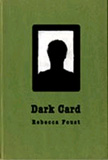October 30, 2008DARK CARD By Rebecca Foust
Review by Lo Galluccio
DARK CARD
By Rebecca Foust
Texas Review Press
English Department
Sam Houston State University
Huntsville, TX, 77341-2146
ISBN# 13: 978-1-933896-14-4
2008, 36 pp., $8.95
www.tamu.edu/upress/
In Rebecca Foust’s first full-length poetry book, Dark Card, she creates a prism of experience, imagery and episode through which to describe and honor her relationship to her son’s struggle with Asperger’s Syndrome. The poems span in time from his bloody (almost mishap) of birth, to schooling traumas, to his rather triumphal eighteenth year when he has finally taken rational charge of things which enable him to function with others smoothly in the world. Far from a mere object lesson, Rebecca’s son is like a strange, wondrous and unruly kite that she must learn to anchor and let fly with the winds of existence. The book is also a reflection of her own transformation as her sense of her son deepens and their bond matures.
In a poem called, “No Longer Medusa,” she states:
When I had you I gave birth
to my mirror
the chink in my armor.
She goes on to say that while she once had the power of “turning men to adamantine,” she is now:
alive
all night with fear for you, undone
by your sweet, milky breath
She describes in a myriad of ways what her son’s “disability” also enables him to do, as if by some fluke of genetic magic. This is balanced against the persecution struggles he faces for being lonely and strange and slow. Rather than being a serene meditation about this drama, she displays a lot of linguistic muscle in concrete images which shape the actual experiences they both face, and pulls the reader right into the quandary of his difference:
—is it disability
or just the difference in intensity
that makes turquoise not quite blue?
(“Unreachable Child”)
Or:
He eats the Almanac
whole, then re-reads it
page-by-page
in his mind.
(“The Visitation”)
Those who are merciless about the obstacles he faces socially, and who fail to catch the glimmer of turquoise or genius in the boy, persecute him in the schoolyard:
How one time they cornered him
behind the storage shed and stoned him
in a hail of oranges, left him
facedown blood-snotted in dirt.
(“Perfect Target”)
Though much of the collection is blank verse, Foust employs inner-rhymes and slant rhymes to graceful effect, formalizing – along with her somewhat British cast of language – a collection of essentially contemporary blank verse. In the title poem, “Dark Card” where she describes her role as being like an “idiot savant” who can play the right card to relieve the sorrow and hurt of her son’s situation, she ends with this Hopkinesque couplet:
how he sees the moonlit vole
on the freeway’s blurred berm.
She also uses the vernacular to effect in tight explosions of fury at those who officiate at her son’s birth and who try to manage his ensuing disability:
around your throat,
the doctor’s ohfuckingshit
when he lifted it andit broke; your blood
on his face, my face, the ceiling
the back wall.
(“Firstborn”)
In “Palace Eunuch” she continues these accusations, as rabidly as Queen Margaret to King Richard III’s mad hypocricy:
Don’t say you were trying to be kind,
you ball-less prick soft dick eunuch
cowardly coin-counting conservator.You were practically pissing yourself
in your fear of malpractice
These are strongly pitched poems brimming with contempt and uncovering the beast behind the professional mask, of those who should be acting as professional doctors or healers. There is the “doctor” and his cursing, “ohfuckingshit” at a child’s birth, and then the insinuation that one who should be focused on deliverance can be pre-occupied with the fear of a malpractice suit. Perhaps only a mother who has gone to law school herself can truly fathom the stark reality of this. A graduate of Stanford Law, this dishonorable behavior does not escape her.
And despite the sublimation of countless observations of her son’s intriguing compulsions and twisted visions into elegant and ironic poems, Faust goes on to say, in several poignant stanzas:
My illiterate heart
is a mother’s that beats
and breaks by rote, but I’m learning
to let him alone and to see
that his pacing and hummng
are how he keeps timein a world made of chaos,
the candle he lights in old night,
how he knits up the frayed cord-end
of every missed synapse,
into something coherent
that sings.
Singing, like poetry, transcends the normal bounds society erects. They are both a soulful feat of expression. In this way, her son is deeply loved and seen as a gift rather than a burden.
Other great poems are “Refrigerator Mom,” “Sometimes the Mole is Merely,” and “Show Your Work.” Overall this is a fiercely startling collection of poems that is sophisticated and accessible at the same time. It is a tribute to the tenacity with which a mother and son’s alchemy can produce intriguing and intense poetry.
Rebecca’s first full-length manuscript was a finalist for Poetry’s 2007 Emily Dickinson First Book Award.
————
Lo Galluccio is a graduate of Harvard College whose poetry chapbook Hot Rain was released on Singing Bone Press in 2003. She’s been nominated for two Pushcart Prizes in poetry and her first full-length prose-poem memoir, Sarasota VII, will be released on Cervena Barva Press in September of 2008. Also a vocal artist, she has two solo CDs out on www.cdbaby.com, “Being Visited” and “Spell on You.” She currently resides in Cambridge, MA and can be reached at Lo747@hotmail.com